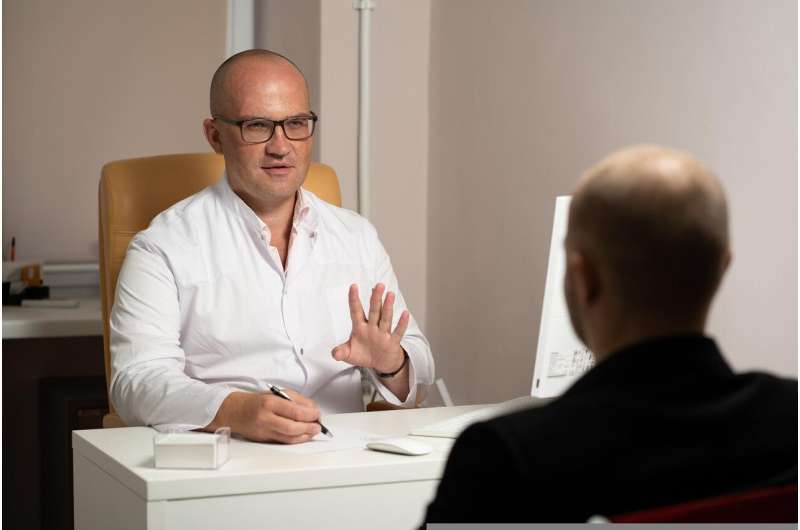This article has been reviewed according to Science X's editorial process and policies. Editors have highlighted the following attributes while ensuring the content's credibility:
fact-checked
peer-reviewed publication
trusted source
proofread
Inpatient addiction services help continue lifesaving medication for opioid use disorder treatment after discharge

Previous research has found that over 80% of people with opioid-use disorder (OUD) do not receive evidence-based lifesaving medications. While access to these medications is better in New York City than elsewhere in the United States, numerous structural and social barriers impede access to treatment, and more than 100,000 people in the U.S. continue to die from drug overdoses each year.
To help close this alarming treatment gap, researchers at NYU Grossman School of Medicine partnered with the New York City public hospital system to investigate if a program offering addiction care to patients with substance-use disorder while they are in the hospital could lead to better uptake of OUD treatment after discharge.
The findings, published online July 29 in JAMA Internal Medicine, indicated this intervention, known as the CATCH program (Consult for Addiction Treatment and Care in Hospitals), was highly effective.
In the first large randomized controlled trial of hospital-based addiction consult services for the treatment of OUD, the team of researchers found that with the CATCH program, the odds of patients initiating medication for OUD treatment post-discharge were eight times higher, and the odds of continuing treatment were nearly six times higher, in comparison to usual care.
"Addiction consult programs like CATCH have tremendous potential to reduce the negative consequences of untreated substance-use disorder," said Jennifer McNeely, MD, principal investigator of the study and associate professor in the Departments of Population Health and Medicine at NYU Langone.
"We have highly effective medications for treating opioid use disorder and preventing overdose, but far too few patients are receiving them. It is our hope that programs like CATCH will be replicated, reimbursed, and rolled out at hospitals across the country, to transform hospital care for patients with substance-use disorder."
People with untreated OUD have high rates of hospital admissions, which can be an opportunity for starting medications for OUD treatment and improving engagement with medical and harm reduction services, said McNeely.
Specialty consult services are common in the hospital, but rare for addiction. For example, if a patient is hospitalized after an asthma attack, they would typically be seen by a pulmonary consult service, which would have specialized providers to make a diagnosis, start medications, and craft a discharge plan for ongoing treatment.
Unfortunately, in most hospitals, patients who are hospitalized after an overdose, or with other complications of a substance-use disorder, there is no specialized care. Programs like CATCH fill this gap.
Beginning in October 2017 and running through January 2021, the randomized trial was conducted in six of the 11 public hospitals run by NYC Health + Hospitals (H+H). Using data from New York State Medicaid claims data and electronic health records to identify patients with substance-use disorder, the investigators analyzed the impact of CATCH on 2,315 hospitalized patients.
CATCH consult teams consisted of a medical clinician, social worker or addiction counselor, and a peer counselor. The investigators assessed whether patients who were not already in treatment prior to hospitalization received medication for OUD in the first 14 days post-hospital discharge, as well as continuation of treatment 30 days after initiation.
Initiation was defined as having at least one outpatient treatment event such as a filled prescription for buprenorphine or an encounter in an opioid treatment program. Engagement in treatment was defined as having two treatment events 30 days after starting medication for OUD.
The majority of identified patients were male (73%) averaging 47 years old. Patients were racially and ethnically diverse, with 31.5% Black and 32.5% Hispanic. Two thirds of patients had three or more chronic medical conditions and at least one diagnosis of serious mental illness.
In the past three years, half had three or more hospitalizations and 58% had three or more visits to the emergency department, while less than half had received any medications for OUD previously.
With the CATCH program, 11% of patients with eligible admissions started OUD medications following discharge, compared to less than 7% when hospitals were providing usual care. Out of all eligible admissions, 7.5% of patients in CATCH hospitals remained in treatment for at least 30 days, compared to 5.5% in usual care. Retention in treatment after six months was low for both the CATCH (3.2%) and control patients (2.4%).
The six H + H hospitals participating in the study have continued offering CATCH even after the study ended.
"NYC Health + Hospitals' Consult for Addiction Treatment and Care in Hospital (CATCH) teams engage patients admitted into the hospital who exhibit symptoms of substance-use disorder. They offer compassionate, wrap-around, cutting-edge addiction care," said NYC Health + Hospitals Medical Director of Substance Use Disorder Services Dan Schatz, MD, MS.
"We have begun thousands of patients on lifesaving buprenorphine treatment through this program, and we are grateful to NYU for partnering with us on a study to show what we have long witnessed every day. The impact of programs like CATCH is indisputable, both in direct clinical outcomes and in catalyzing cultural change within hospitals to make them the gold standard of care.
"These teams, located at six of our hospitals, are bringing care directly to patients who need it the most, ensuring that patients have the resources and treatment that they need."
Despite the success of CATCH, treatment for OUD following hospitalization remains low, largely due to structural and social barriers, reminds McNeely—highlighting the need for further efforts to improve hospital and community-based services for treatment.
Additional research is also needed to determine if addiction consult services may be effective in boosting initiation to treatment for patients with non-opioid substance-use disorders following discharge from hospital, the investigators said.
More information: Addiction consult services for opioid use disorder treatment initiation and engagement: Cluster randomized clinical trial, JAMA Internal Medicine (2024). DOI: 10.1001/jamainternmed.2024.3422



















